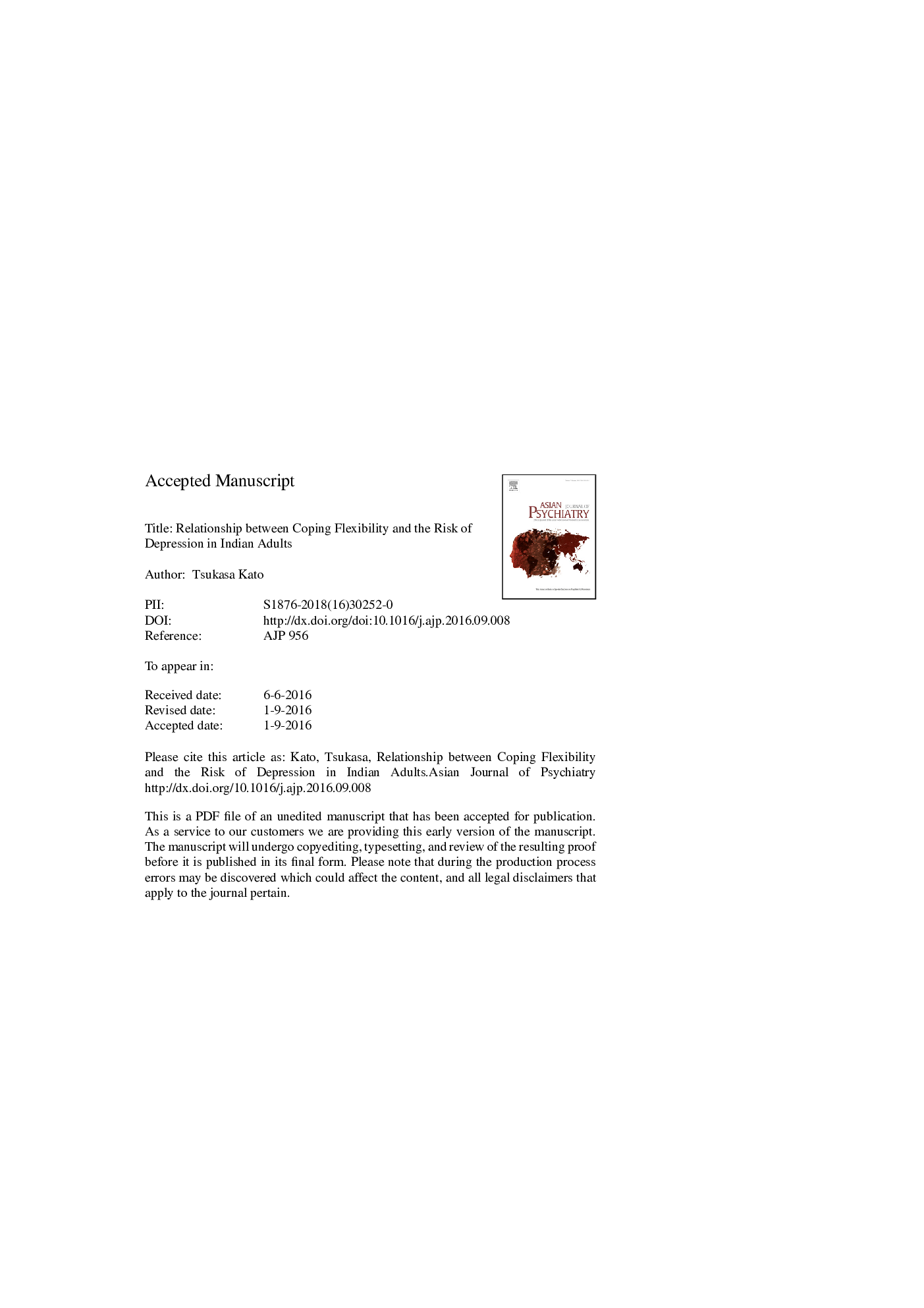| کد مقاله | کد نشریه | سال انتشار | مقاله انگلیسی | نسخه تمام متن |
|---|---|---|---|---|
| 4929919 | 1432579 | 2016 | 23 صفحه PDF | دانلود رایگان |
عنوان انگلیسی مقاله ISI
Relationship between coping flexibility and the risk of depression in Indian adults
ترجمه فارسی عنوان
رابطه انعطاف پذیری مقابله با خطر افسردگی در بزرگسالان هند
دانلود مقاله + سفارش ترجمه
دانلود مقاله ISI انگلیسی
رایگان برای ایرانیان
ترجمه چکیده
با توجه به تئوری دوبعدی انعطاف پذیری مقابله، انعطاف پذیری مقابله ای توانایی متوقف کردن یک استراتژی مقابله با بی ثمر و ایجاد یک استراتژی مقابله با جایگزین است. به منظور تست فرضیه انعطاف پذیری مقابله ای که بیان می کند که مقابله انعطاف پذیر، نتایج انطباقی را ایجاد می کند، ارتباط بین انعطاف پذیری مقابله و خطر افسردگی در متن بزرگسالان هند مورد بررسی قرار گرفت. شرکت کنندگان (150 مرد و 150 زن) پرسشنامه های انعطاف پذیری مقابله ای و علائم افسردگی را پاسخ دادند. خطر افسردگی با استفاده از پرسشنامه سلامت بیمار 9 نمره از 10 و مرکز مقیاس افسردگی مطالعات اپیدمیولوژیک 16 امتیاز به عنوان نقطه برش بررسی شد. تجزیه و تحلیل رگرسیون لجستیک نقاط برش نمره نشان داد که سطح بالاتری از انعطاف پذیری مقابله با خطرات کمتر افسردگی پس از کنترل برای تأثیرات جنسیت، سن و وضعیت تاهل مرتبط است. به طور کلی، فرضیه انعطاف پذیری مقابله در این نمونه بزرگسال هند پشتیبانی شد. این یافته ها ممکن است به جلوگیری از افسردگی مجدد و کاهش علائم افسردگی کمک کند.
موضوعات مرتبط
علوم زیستی و بیوفناوری
علم عصب شناسی
علوم اعصاب (عمومی)
چکیده انگلیسی
According to the dual-process theory of coping flexibility, coping flexibility is the ability to discontinue an ineffective coping strategy and produce and implement an alternative coping strategy. In order to test the coping flexibility hypothesis, which posits that flexible coping produces adaptive outcomes, the relationship between coping flexibility and the risk of depression was examined in the context of Indian adults. Participants (150 men and 150 women) answered questionnaires measuring coping flexibility and depressive symptoms. The risk of depression was assessed using a Patient Health Questionnaire-9 score of 10 and a Center for Epidemiologic Studies' Depression Scale score of 16 as cut-off points. Logistic regression analyses of the score cut-off points revealed that higher levels of coping flexibility were associated with lower risks of depression, after controlling for the effects of gender, age, and marital status. Overall, the coping flexibility hypothesis was supported in this Indian adult sample. These findings might contribute to preventing recurrent depression and to attenuating depressive symptoms.
ناشر
Database: Elsevier - ScienceDirect (ساینس دایرکت)
Journal: Asian Journal of Psychiatry - Volume 24, December 2016, Pages 130-134
Journal: Asian Journal of Psychiatry - Volume 24, December 2016, Pages 130-134
نویسندگان
Tsukasa Kato,
